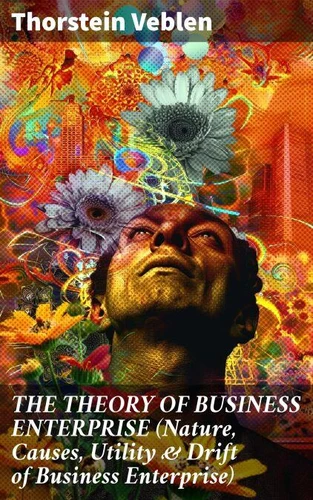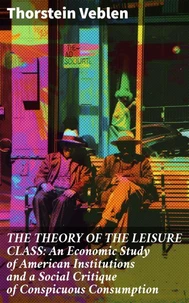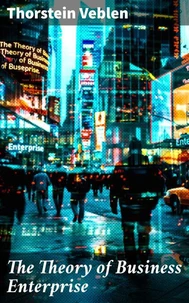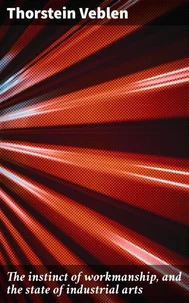THE THEORY OF BUSINESS ENTERPRISE (Nature, Causes, Utility & Drift of Business Enterprise). A Political Economy Book
Par :Formats :
Disponible dans votre compte client Decitre ou Furet du Nord dès validation de votre commande. Le format ePub est :
- Compatible avec une lecture sur My Vivlio (smartphone, tablette, ordinateur)
- Compatible avec une lecture sur liseuses Vivlio
- Pour les liseuses autres que Vivlio, vous devez utiliser le logiciel Adobe Digital Edition. Non compatible avec la lecture sur les liseuses Kindle, Remarkable et Sony
 , qui est-ce ?
, qui est-ce ?Notre partenaire de plateforme de lecture numérique où vous retrouverez l'ensemble de vos ebooks gratuitement
Pour en savoir plus sur nos ebooks, consultez notre aide en ligne ici
- Nombre de pages224
- FormatePub
- ISBN859-65--4780658-5
- EAN8596547806585
- Date de parution10/01/2024
- Protection num.Digital Watermarking
- Taille723 Ko
- Infos supplémentairesepub
- ÉditeurGOOD PRESS
Résumé
In "The Theory of Business Enterprise, " Thorstein Veblen presents a critical examination of the capitalist enterprise, analyzing its nature, causes, utility, and inherent tendencies. Veblen employs a distinctively analytical and often satirical literary style, intertwining economic theory with sociological insights to explore the contradictions and conflicts inherent in business enterprises. This work, published amidst the burgeoning industrialism of the early 20th century, remains pivotal for understanding the dynamics of modern capitalism.
Veblen'Äôs critiques of profit motives and the role of business practices highlight the tension between technological advancement and social welfare, thus situating the text within the broader debates surrounding the economic theories of his time. Thorstein Veblen, an eminent American economist and social critic, is best known for his contributions to institutional economics. His background in sociology and his keen observations of the early 1900s shaped his critical perspective on capitalism, as he often questioned the traditional economic assumptions prevalent among his contemporaries.
Veblen's personal experiences of social privilege and class contrast may also have informed his profound critiques of business enterprises and their societal implications. For anyone interested in the complexities of capitalism and the role of business in society, "The Theory of Business Enterprise" stands as an essential read. Veblen's incisive analysis not only sheds light on the historical context of industrial capitalism but also provokes contemporary readers to reflect on the ongoing challenges within modern business practices.
This text is invaluable for students, scholars, and general readers seeking a deeper understanding of economic and social systems.
Veblen'Äôs critiques of profit motives and the role of business practices highlight the tension between technological advancement and social welfare, thus situating the text within the broader debates surrounding the economic theories of his time. Thorstein Veblen, an eminent American economist and social critic, is best known for his contributions to institutional economics. His background in sociology and his keen observations of the early 1900s shaped his critical perspective on capitalism, as he often questioned the traditional economic assumptions prevalent among his contemporaries.
Veblen's personal experiences of social privilege and class contrast may also have informed his profound critiques of business enterprises and their societal implications. For anyone interested in the complexities of capitalism and the role of business in society, "The Theory of Business Enterprise" stands as an essential read. Veblen's incisive analysis not only sheds light on the historical context of industrial capitalism but also provokes contemporary readers to reflect on the ongoing challenges within modern business practices.
This text is invaluable for students, scholars, and general readers seeking a deeper understanding of economic and social systems.
In "The Theory of Business Enterprise, " Thorstein Veblen presents a critical examination of the capitalist enterprise, analyzing its nature, causes, utility, and inherent tendencies. Veblen employs a distinctively analytical and often satirical literary style, intertwining economic theory with sociological insights to explore the contradictions and conflicts inherent in business enterprises. This work, published amidst the burgeoning industrialism of the early 20th century, remains pivotal for understanding the dynamics of modern capitalism.
Veblen'Äôs critiques of profit motives and the role of business practices highlight the tension between technological advancement and social welfare, thus situating the text within the broader debates surrounding the economic theories of his time. Thorstein Veblen, an eminent American economist and social critic, is best known for his contributions to institutional economics. His background in sociology and his keen observations of the early 1900s shaped his critical perspective on capitalism, as he often questioned the traditional economic assumptions prevalent among his contemporaries.
Veblen's personal experiences of social privilege and class contrast may also have informed his profound critiques of business enterprises and their societal implications. For anyone interested in the complexities of capitalism and the role of business in society, "The Theory of Business Enterprise" stands as an essential read. Veblen's incisive analysis not only sheds light on the historical context of industrial capitalism but also provokes contemporary readers to reflect on the ongoing challenges within modern business practices.
This text is invaluable for students, scholars, and general readers seeking a deeper understanding of economic and social systems.
Veblen'Äôs critiques of profit motives and the role of business practices highlight the tension between technological advancement and social welfare, thus situating the text within the broader debates surrounding the economic theories of his time. Thorstein Veblen, an eminent American economist and social critic, is best known for his contributions to institutional economics. His background in sociology and his keen observations of the early 1900s shaped his critical perspective on capitalism, as he often questioned the traditional economic assumptions prevalent among his contemporaries.
Veblen's personal experiences of social privilege and class contrast may also have informed his profound critiques of business enterprises and their societal implications. For anyone interested in the complexities of capitalism and the role of business in society, "The Theory of Business Enterprise" stands as an essential read. Veblen's incisive analysis not only sheds light on the historical context of industrial capitalism but also provokes contemporary readers to reflect on the ongoing challenges within modern business practices.
This text is invaluable for students, scholars, and general readers seeking a deeper understanding of economic and social systems.










